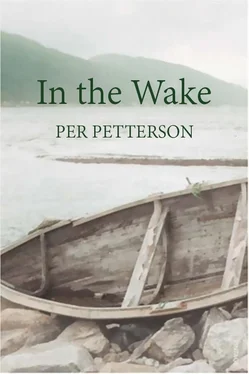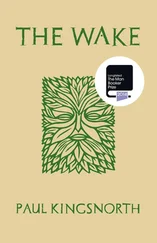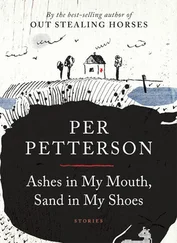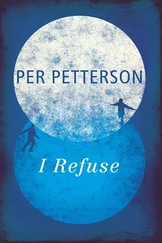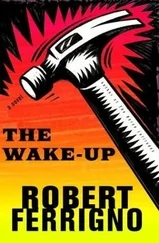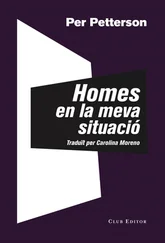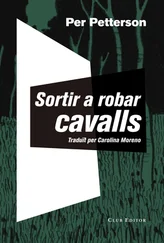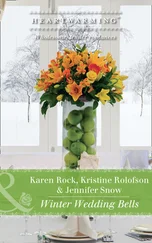“What do you think?” he asks and gestures at the easel. I look at the picture. It is good. It is very good. It is exactly as I imagine it; glimmering, floating, for ever shut.
“You have always been a good painter,” I say.
“It is a long time since I did anything. I have been at it for several days. You know where it is?”
I nod. “Oh, yes,” I say.
“What do you think when you look at it?” he asks. His face is crushingly calm. His eyes have dark shadows. I am not sure if I like him like this. Why does he suddenly have to ask me about that now?”
“I think all that has gone to hell,” I say.
“I don’t.”
“Good for you,” I say.
I have often talked tough to him, felt free to do so as his little brother, but never like this, sharp, bitter. Something in his expression provokes me, the serenity he shows, and his new appearance, as if he has seen the Light. A quarter of an hour ago I felt quite good myself, but now my heart is in my mouth. In a few minutes only our roles have reversed. There is an itch at my back and he smiles just as calmly and looks at me with that look, puts his brush in a jar and wipes his hands on a rag. Out of the window behind him I see a boat on the river, it pounds against the current and barely moves forward until it gives up and turns in a big arc towards the opposite shore and suddenly puts on speed and disappears.
“Well, it is,” he says, peering at me.
“Shall we go?” I ask.
“I just have to go up for a shower and a change. Get cleaned up.”
“Undoubtedly,” I say.
“It’s the seventh of April, Arvid. Cut it out,” he says without raising his voice.
I take a deep breath. “OK,” I say.
We both glance at the picture, and then walk up the stairs to the ground floor. He goes first and I follow, and his steps are not as heavy as they used to be, and he walks on up to the first floor while I go into the kitchen and sit down by the specially designed table. Here almost everything is unchanged. Solid and simple with few colours and a lot of polished metal, like a ship’s galley or a communal kitchen, only much more expensive. The floor is composed of unusually wide planks, brought here from a sawmill in Høland. Even the door handles are masculine, Randi used to say. It was not really her style, but he had it all planned in beforehand. Now she can do as she likes, and I am certain she will. I roll a cigarette and get up to find an ashtray. That’s not easy, neither of them smokes, and neither of them liked me to when I came to visit. But then I have not been to see them much since they moved to this place. I get a saucer from the cupboard and sit down at the table to wait and smoke and look at the river. There are no boats on it now. Only the sun on the flowing green water and the booms on the other side.
When he comes downstairs he has showered and changed his clothes. They hang on him a bit, and his belt has more holes than it has had for twenty years. With his damp hair combed back the thinness of his face is even more obvious. He looks many years younger or perhaps just different. It is not easy to say. He stops and looks at my cigarette and says: “Haven’t you given those up yet?”
“They’re probably no worse than Sarotex,” I say, “or what do you think?” And the next moment I repent my words because his face goes blank, its calmness gone, and he takes one step forward and then one back, he moves his mouth and is about to say something, and then he says nothing. I lower my eyes and look at the cigarette I hold between my fingers, stub it long and thoroughly on the saucer and look at the floor while I slowly get up from my chair. Then I look up again, and we stand staring at each other. His body grows heavier, his back bends, and his brow sinks, as if filled with the most terrible thoughts in the world and he alone had to carry them on his shoulders as the only man with a painful past, and I suddenly do not feel repentant any more. It was well said, I think, goddamnit, it was well said, and that he can read in my eyes, for he clenches his hands and red spots appear on his pale face, and then he comes quickly towards me and with full conviction hits me on the chest with a clenched fist so hard I have to take one step back.
“You stupid ass,” he says, “you damned halfwit, you selfish little shit,” he says, hitting me again and still harder now, and I stand with my back against the table and can go no further and have to make a decision pretty quickly. I hit him back. Right on the chin. Maybe not that hard, but just hard enough. It feels good. He jumps back, and I hit him once more. In his stomach this time. I do not know what he had expected, but he did not expect this. He bends over with his hand round his chin, and I slip away from the table to the middle of the room with my hands clenched and raised in front of my chest before lunging out again like my father did in the photograph above the radio at home when the world was young and he was still younger; his crazy body naked to the belt with its shining shoulders and dancing feet and dancing curls and his left arm straight out in a punch like a battering ram. Or as in the picture cards I found in a bundle in a box in the attic; one card for each position with arrows for foot movements and arrows for the angle and direction of the arms, like a dancer’s beginner’s course, really, foxtrot, waltz and cha-cha-cha, but here on small cards with descriptions underneath in tiny writing: straight left, left hook, right hook, uppercut, and so on, there were at least ten of those cards in all, and I can see them clearly before me now, and once or twice some years ago I tried them out for myself, step by step, blow by blow, behind a closed door and felt like an idiot. Maybe that’s what I am now, but I do not feel like it. I dance round my brother who straightens up with a confused look in his eyes. He coughs after the blow in the stomach and tries to catch my eye and twists round as I keep on dancing, and I hit out a few times into the air.
“Selfish. Am I selfish? What about you trying to get out of everything and leave me alone. What about David? You fucking prick,” I shout, and he lets out a roar and throws himself at me, and neither right hook nor straight left or any other blow I know is of any use, for he lands on my chest and I go down with him, and we fall on his elegant floor and roll around. I go on hitting out while he wraps his arms round my chest so hard I can scarcely breathe. My side really hurts and I am close to howling. I twist as much as I can and roll us on until we meet one table leg and push the table along the floor right over to the bench where it stops and starts to crack, and then the leg breaks, and the table tips down over our heads. My brother lets go, air comes squealing into my lungs, and he screws himself into a sitting position holding on to the edge of the table and shouts: “Have you any fucking idea how much that table cost me?”
I sit up with a hand to my side and push myself out from under the table. Carefully I breathe as deep as I can, but it is not easy, for my heart is beating wildly, and with each lungful of breath I feel a stab to my side.
“How much did it cost?” I weakly ask.
He looks at me, and then at the table, he is breathing as hard as I am, and then he says: “Fuck the table,” and gives it a kick, and it tilts up and stops on its edge, and the broken leg comes right off and falls to the floor with a sound like a bamboo bell in the forest, one early morning, in China or someplace. “I’ve never really liked it. It is too posh. It is just that I can’t afford anything new right now. It is starting to look empty in here.”
“I have the old kitchen table from Veitvet in the cellar,” I say. “You can have that.”
Читать дальше
